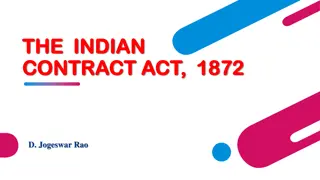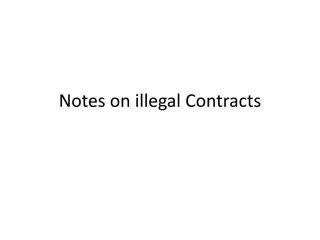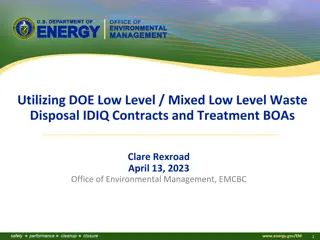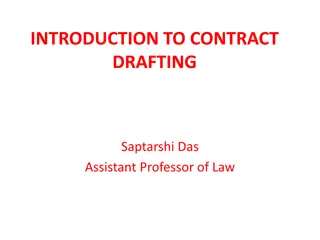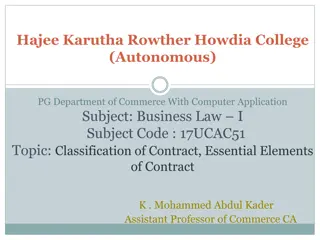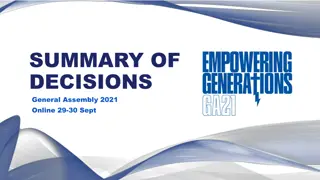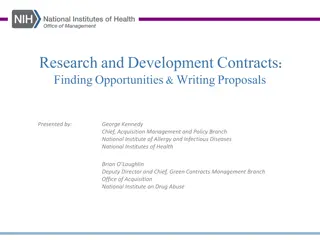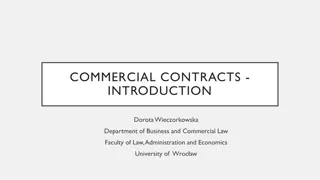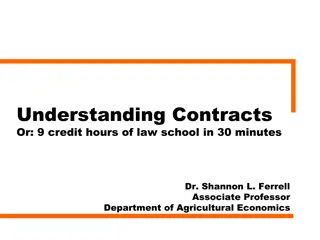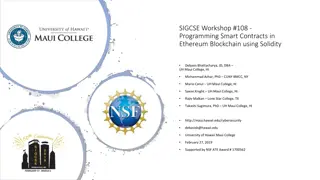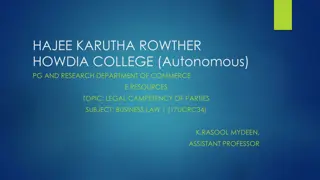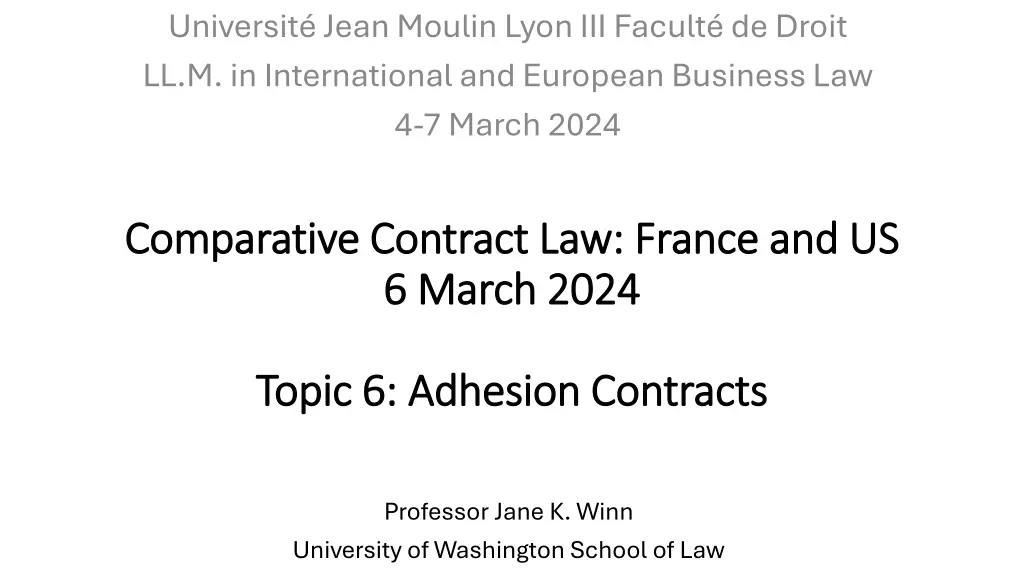
Comparative Contract Law: Adhesion Contracts and Unconscionability Analysis in France and the US
Delve into the realm of adhesion contracts and explore the nuances of unconscionability within contract law in France and the US. Gain insights into legal standards versus rules, the UCC 2-302 provision on unconscionable clauses, and the implications of ex-ante and ex-post considerations in contract disputes.
Download Presentation

Please find below an Image/Link to download the presentation.
The content on the website is provided AS IS for your information and personal use only. It may not be sold, licensed, or shared on other websites without obtaining consent from the author. If you encounter any issues during the download, it is possible that the publisher has removed the file from their server.
You are allowed to download the files provided on this website for personal or commercial use, subject to the condition that they are used lawfully. All files are the property of their respective owners.
The content on the website is provided AS IS for your information and personal use only. It may not be sold, licensed, or shared on other websites without obtaining consent from the author.
E N D
Presentation Transcript
Universit Jean Moulin Lyon III Facult de Droit LL.M. in International and European Business Law 4-7 March 2024 Comparative Contract Law: France and US Comparative Contract Law: France and US 6 March 2024 6 March 2024 Topic 6: Adhesion Contracts Topic 6: Adhesion Contracts Professor Jane K. Winn University of Washington School of Law
Topic 6: Contracts of Adhesion Winn & Webber, Unfair versus Unconscionable Brower v. Gateway New York Times Arbitration Everywhere Hubbert v. Dell
Unconscionability versus Unfair Contract Terms
Ex ante versus ex post EU Unfair Contract EU Unfair Contract Terms Law Terms Law US US Unconscionability Unconscionability EX ANTE EX ANTE EX POST EX POST Preliminary Preliminary Negotiations Negotiations Contrac Contrac t t Formed Formed Disput Disput e e Arises Arises Breach Breach Litigation Litigation
Kaplow, Rules v. Standards, Duke Law Journal 1992 Rules have content ex ante Anyone with basic legal training reading a rule and applying it to a fact pattern would reach the same conclusion Three days Three business days Three banking days Works well when fact patterns are consistent across time and contexts, and consensus exists about what is relevant Efficient for those with access to legal advice and capacity to plan (e.g., corporations), may be surprising and harsh for ordinary people Standards have content ex post After a court has applied a standard to a fact pattern, then it is possible for anyone else to apply it and reach the same result, but not before Due process Timely notice Reasonable care Works well when context is evolving or is persistently diverse, and limited or no consensus yet about what is relevant Efficient for resolving one-off disputes fairly, difficult to use in planning Holmes/Legal Realism: Abstract rules do not decide specific cases [abstract rules are really disguised standards, not rules at all]
Unconscionability UCC 2-302 If the court as a matter of law as a matter of law finds the contractor any clause of the contract to have been unconscionable at the time it was made the court may: refuse to enforce the contract, or it may enforce the remainder of the contract without the unconscionable clause, or it may so limit the application of any unconscionable clause as to avoid any unconscionable result.
Unconscionability II UCC 2-302 does not define unconscionability Although it should be determined at time of contract formation, not at the time of enforcement Unconscionability is a question of law for judge, not question of fact for jury Parties should be allowed to present evidence of context Case law developments establish 2 branches: Procedural unconscionability (contract formation) Substantive unconscionabilty (contract terms) Are both required, or only one? If both, sliding scale? What is a contract of adhesion? Drafted by one party, offered on a take it or leave it basis Cannot be per se procedurally unconscionable because 99% of US consumer contracts are contracts of adhesion
Unconscionability UCC Unconscionability UCC 2 2- -302 302 Procedurally Procedurally Unconscionable Unconscionable Contract of Contract of Adhesion Adhesion Ordinary Ordinary Contract Contract Ordinary Ordinary Contract Contract Really Really Bad Deal Bad Deal Substantively Substantively Unconscionable Unconscionable
Unfair Contract Terms Laws 1994 European Union directive codified UK, French & German law 2016 implemented in 28 EU member states 2000 Japan Consumer Contract Law 2010 Australia Unfair Contract Terms Law Under consideration in New Zealand Thailand, others?
Fraud to Unfair to Warranty Fraud Fraud (LYING) Both US & France Prohibit Unfair Unfair France always prohibits, US randomly, but rarely, prohibits Warranty Warranty France usually requires, US rarely requires Unconscionability Unconscionability Both US & France Prohibit
Substance: Unconscionability vs. Unfair Contract Terms Unconscionability is an exceptional defense based on equity [standard/principle] Applies on facts very close to fraud (LYING) Victim must be without blame, plaintiff must be opportunistic Procedural versus Substantive Unconscionability Breakdown of bargaining process [AND?? OR?? Term so unfair it could be blocked under fraud, duress, incapacity [NO MEANINGFUL CHOICE] Unfair contact terms is a regulation [rule] clarified with detailed examples plus agency interpretation Standard form contract Drafted by merchant Take-it-or-leave-it Contrary to good faith produces significant imbalance to Contrary to good faith produces significant imbalance to detriment of consumer detriment of consumer (standard/principle similar to unconscionability but broader) 19 concrete examples in annex to Directive based on common problems AND?? OR?? ]
Procedure: Unconscionability versus Unfair Contract Terms Unconscionability is both defined and enforced through private litigation Estimate 99.9% of unconscionability claims in practice rejected, but broad decisions in 0.01% successful cases destabilize doctrine ( all adhesion contracts are procedurally unconscionable ) Notice pleading Contingency fees Broad pretrial discovery of evidence Elected judges Class actions Punitive damages Unfair contact terms are defined by independent collegial body and enforced through private litigation CCA reviews contracts at request of consumer advocates, government Investigates market conditions, builds consensus among judicial, merchant, consumer and academic members Recommendations and opinions detailed, balanced, internally consistent and stable over time If no voluntary compliance, then representative actions by consumer groups to enforce
Net Result? From 1950s to 1980s, United States was world leader in consumer protection law Since 1980s, return to 19th century-style philosophy of free market and individualism Intense competition in U.S. retail market brings lowest prices, best customer service in the world The customer is always right Since 1980s, EU has become world leader in consumer protection law European integration through environmental, consumer protection laws to limit free market Lack of competition in EU retail market due to restrictive trade practices law, labor laws, real estate development laws brings high prices, bad customer service Remember that in France, the customer is always wrong.
Essay Question Review assigned readings Laidlaw v. Organ: Anglo-Saxon commitment to individual responsibility & market exchange Good faith extends to pre-contractual negotiations: support for weaker party, social solidarity Historical origins help explain this difference Hadley v. Baxendale 1854 borrowed holding from Napoleonic Code, still cited in US today even though an English case Foreseeability is important for businesses making financial investments in a capitalist system, both France and US are capitalist
Brower v. Gateway, Hubbard v. Dell B v. G: One year after Hill v. Gateway, raised unconscionability Rejected unconscionability Oppressiveness of arbitration term (similar to Bragg), Gateway agreed to US arbitration AAA NAF, because US federal policy strongly favors arbitration 1925 Federal Arbitration Acy H v. Dell: dismiss for arbitration
Title & Citation Relevant Facts General Rule Issue in Case WHETHER WHEN Holding [Rationale]
Issue Spotter Exam Question Issue WHETHER WHEN General Rule Apply One Side Apply Other Side Conclusion Yes/Maybe/No





